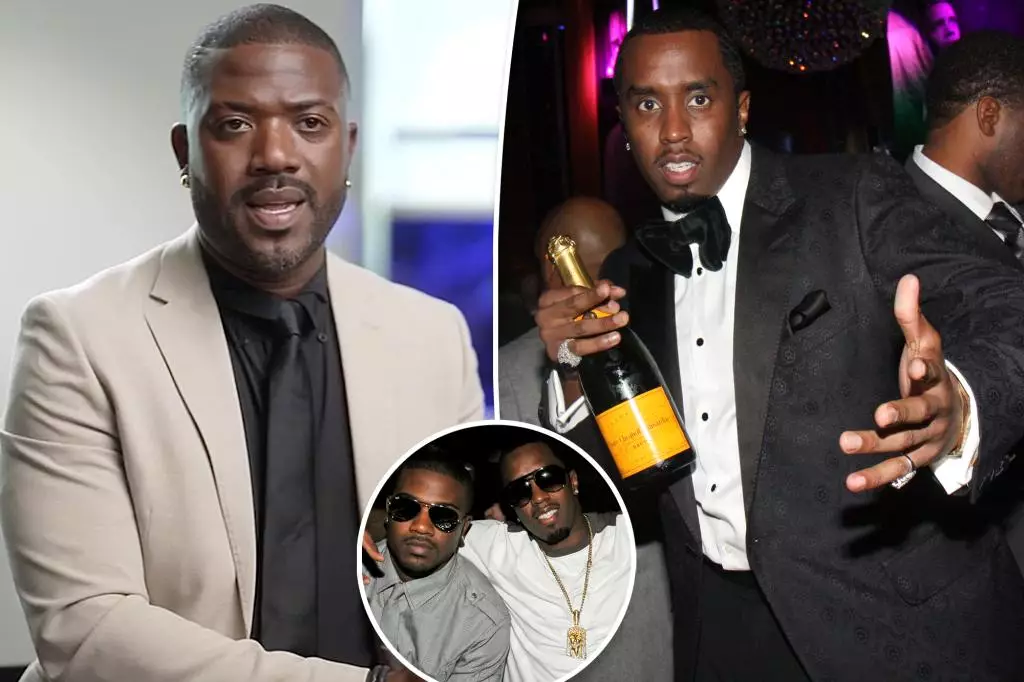In the world of celebrity, the allure of fame often comes entwined with shadows, secrets, and scandal. Recently, singer Ray J shed some light on the hidden narratives that often surround high-profile individuals, particularly in connection with the legal issues facing Sean “Diddy” Combs. The allegations and speculations swirling around Diddy’s life have sparked discussions not just about the man himself, but about the broader implications of fame, silence, and complicity in the entertainment industry.
While speaking with Harvey Levin from TMZ about the documentary titled “The Downfall of Diddy: Inside the Freak-Offs”, Ray J made explosive claims regarding fellow celebrities who may be using a victim narrative to shield themselves from controversy. He suggested a pervasive culture of silence maintained through financial means, where individuals, including those who may have experienced wrongdoing, are offered money to keep quiet. “People do catch and kills all day,” he remarked, implying a system where truth is often buried for profit.
This raises a profound question about accountability in celebrity culture. When figures within the entertainment industry decide to skirt their moral compass for the sake of financial gain or reputation preservation, what does that mean for their integrity? Ray J’s comments suggest that there exists a network of enablers—those who not only remain silent but actively participate in maintaining the façade of innocence and normalcy amidst chaos.
Ray J further elaborated that numerous A-list figures have reached out to him, sharing their experiences and seeking a confidant in their turmoil. The gravity of this revelation is not merely in the act of communication; it speaks volumes about the fear and intimidation felt by individuals in the industry when faced with the prospect of speaking out against powerful figures like Diddy. This dynamic of fear against fame manifests as a significant barrier to justice, a critical aspect of the culture that merits examination.
The entanglements of various high-profile figures complicate the narrative even further. The implications of these undisclosed affiliations raise ethical concerns regarding the responsibility of public figures in addressing wrongdoing. Are they complicit by their silence, or are they victims of a system designed to protect the powerful? The inability or unwillingness to discuss these experiences publicly highlights an unsettling truth: the need for safety often overrides the quest for justice.
Diddy’s recent legal troubles, including charges related to sex trafficking and racketeering, add another layer to this narrative. With claims made by Texas-based attorney Tony Buzbee that the consequences of these allegations will not only implicate Diddy but also expose his accomplices, a more significant societal reflection emerges. How do we assess the behaviors of those who enable toxic environments? This question is pivotal as it connects to the much broader issue of accountability within high-society circles.
Amidst Diddy’s legal battles, reports indicate that family dynamics are also frayed. His sons have allegedly become embroiled in a conflict with Ray J—a disturbing sign of the complexities that arise when personal lives collide with public image. While members of the Combs family navigate the fallout of their father’s alleged actions, it showcases a different side to celebrity life. The ramifications stretch beyond individual actions, affecting families and friends who find themselves caught in the crossfire of scandal.
As Ray J’s revelations continue to unfold, they highlight an urgent need for a cultural re-evaluation regarding how we perceive fame, power, and accountability. The dialogue initiated by these statements serves as a clarion call for deeper introspection and action within the entertainment industry.
For all those who inhabit the glamorized world of celebrity, the cost of silence and complicity could be too high—for them and for those affected by their actions. If the allure of fame is not accompanied by responsibility and transparency, then the consequences will ripple outward, creating a culture that ultimately endangers its most vulnerable members.
The events surrounding Diddy and Ray J’s confessions bring to light the pervasive issues of secrecy and accountability within the entertainment world. The call for a major overhaul of societal attitudes toward fame, power, and ethical responsibility is loud and clear. It is imperative that those who occupy the spotlight begin to acknowledge their own roles in perpetuating the shadows that loom over their industry.


Leave a Reply